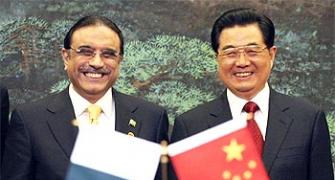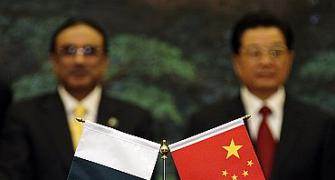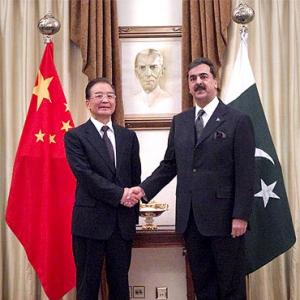It appears that there is some coordination between Chinese interlocutors, the Hekmatyar group, the Kabul regime and different tribal factions in Afghanistan and Pakistan. This indicates a long-term vision for the region, says Srikanth Kondapalli
Three significant developments emerged during Pakistan Prime Minister Syed Yousuf Raza Gilani's just-concluded visit to Beijing.
First, the joint declaration between the two countries was critical indirectly of the United States's recent military action in killing Osama bin Laden at Abbottabad earlier this month a a place where in December 2006, China's Special Operation Forces with helicopters moved in to conduct 'encirclement, assault and mop-up' counter-terrorism exercises with Pakistan.
During this visit by Gilani, Premier Wen Jiabao said Pakistan's sovereignty and territorial integrity should be respected -- echoing Gilani's statement in the Pakistan parliament while criticising the US military action. Earlier, the Chinese used to cite these phrases to counter the Indian position in South Asia. It appears now it is the US's turn to face the Chinese music -- despite more than $20 billion in aid that the US contributed to Pakistan in the last decade.
Second, the Chinese foreign ministry spokeswoman Jiang Yu on May 18 said China 'will unswervingly continue to support Pakistan's efforts to fight terrorism' -- underlining the fact that China needs Pakistan's (and the Taliban's) support to control Uighur protests in the north-western region of Xinjiang.
While China had stated in this joint statement and others repeatedly about non-interference in the internal affairs of any country, including Pakistan, it had, nevertheless, demanded the Pakistan Army as well as its intelligence wing hand over Uighur leaders trained by the Al Qaeda. According to Gen Xiong Guangkai, former deputy chief of general staff of the Chinese army (and a former military intelligence officer who reportedly trained the Mujahideen in the 1980s), more than 1,000 Uighurs were trained by the Al Qaeda in Pakistan and Afghanistan in the last decade. Thus, while Pakistan refused to hand over any terrorist either to the US or to India, it was forced to hand over a deputy leader, Rashid of the banned East Turkistan Islamic Movement, to the Chinese.
This is a crucial factor in the Chinese calculus. In November 2000 China's ambassador to Pakistan met with Mullah Omar, the second-in-command of the Taliban at Kandahar in an effort to evolve an understanding with the latter. It appeared that China had then proposed opposing sanctions at the United Nations on the Taliban, in lieu of the Taliban's delinking from the Uighurs. However, 9/11 changed such prospects.
In the recent past, it was reported that in the event of the US withdrawal of troops from Afghanistan from July 2011 (as announced by President Barack Obama), China is likely to revive its understanding with the Taliban for the stability of Xinjiang. In this context, it was reported that Chen Xiaogong, the then deputy chief of the army in the 1990s, had supplied arms to Gulbuddin Hekmatyar. Today, it appears that there is some coordination between the Chinese interlocutors, the Hekmatyar group, the Kabul regime and different tribal factions in Afghanistan and Pakistan. This indicates a long-term vision for the region.
Third, Pakistan had secured from China substantial economic and military assistance. A free trade area is in place from 2006, raw materials exploitation is in full swing in different parts of Pakistan, while China is building (often without international competitive bidding) infrastructure projects such as widening Karakoram highway, railway projects (closer to Abbottabad), port facilities at Gwadar and Karachi, hydro-electric projects in Pakistan-occupied Kashmir, etc. Also, Pakistan procured 50 new fighter aircraft from China during Gilani's visit.
China had in the recent past substantially increased military supplies to Pakistan -- including JF-17 fighters, four frigates, six submarines, early warning aircraft and other ground forces equipment. More such projects are committed during this visit. Some Chinese retired naval officers and others have also demanded recently that China should set up military "facilities" in Pakistan. After the Chinese assistance to the Chashma III and IV nuclear power plants were cleared by the International Atomic Energy Agency in March this year (as a counter to the US-India 123 agreement), and as moves towards the Fissile Material Cut-off Treaty are being made, the recent news about substantial increases in Pakistan's capability to produce nuclear warheads, is not surprising.
The above point to further cementing of ties between Beijing and Islamabad. Both leaders boast of "all-weather" friendship -- meaning no change in bilateral relations despite a fast-changing regional or international landscape. In the light of the US withdrawal from Afghanistan, such relations are conducive to expanding China's reach in South, Central and West Asia -- to the detriment of India, the US and Russia.
Srikanth Kondapalli is a Professor in Chinese Studies at JNU








